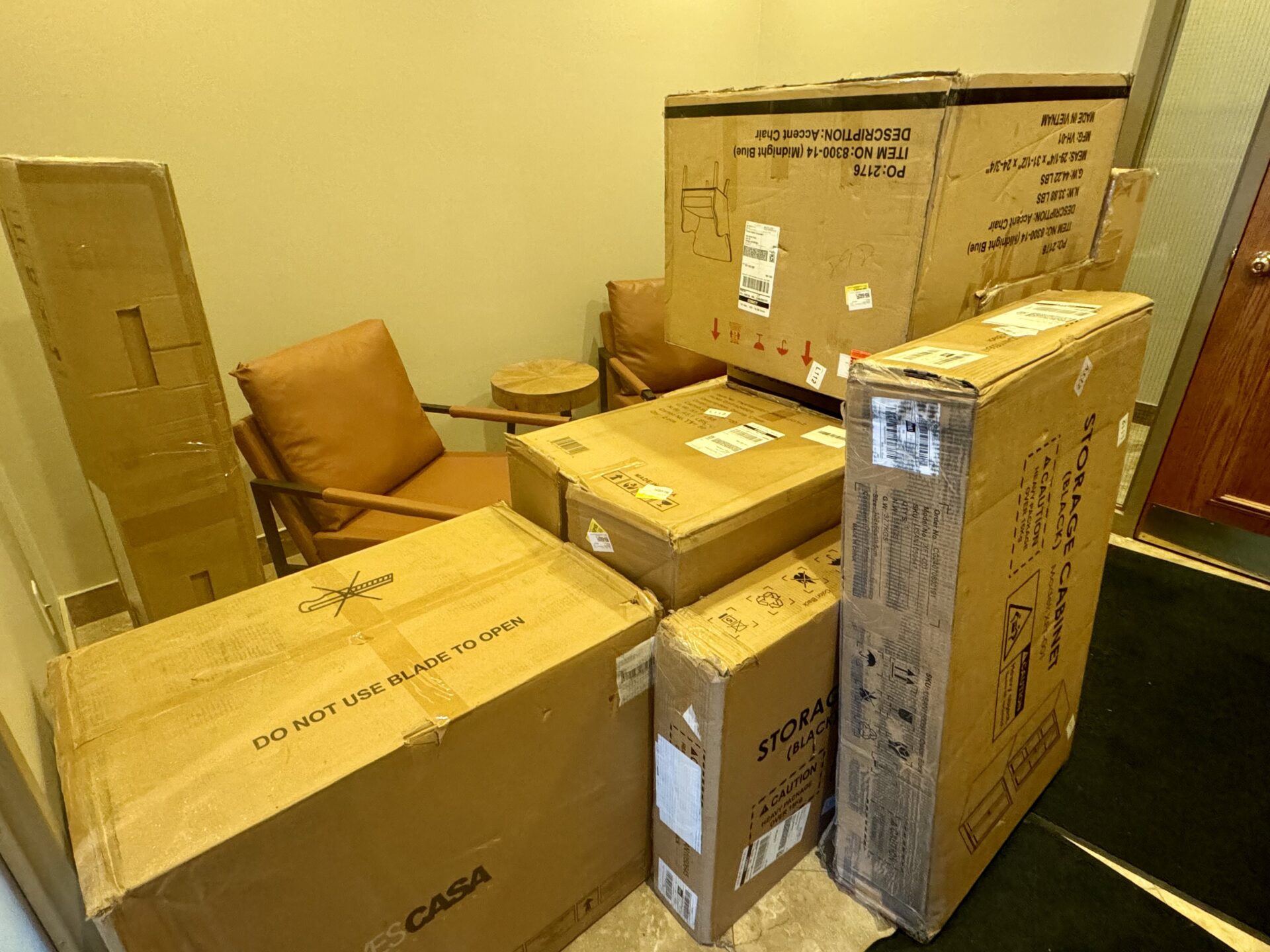
We’re finally moved into our new digs. Not yet settled, but we’re getting there.
For the most part, the move went smoothly.
Truthfully, I didn’t have to do a whole lot… I’m fortunate that I work with some ladies who are much more organized and efficient than I am. 😊
There’s still some unpacking to do, and furniture to build… but for the most part, we’re back up and running at full speed.
During the move (and leading up to it) we’ve had to do quite a bit of coordinating with our new landlord.
And he’s been fantastic to deal with.
This is a guy who owns a lot of office space around the city (particularly in the area we just moved into) yet has a way of making you feel like you’re his only tenant.
He’s owned most of his properties for many years… and keeps them in great shape!
I don’t know the full extent of his real estate holdings… but just based on the buildings I’m aware of… he has a pretty impressive portfolio.
And If I were a betting man, I would bet that he carries very little debt (if any) against these properties.
I’m not really a betting man, but I am a numbers guy, and just based on how reasonable our lease rate is, it makes me conclude that he’s not too worried about having to cashflow his mortgage every month.
And this got me thinking… about real estate.
More specifically, Canadian real estate.
My current landlord is able to run his business the way he wants to run it, because he’s not overly leveraged.
Because he’s not overly leveraged, he doesn’t have to worry himself too much about interest rates, bank covenants, mortgage payments, etc.
And because he’s not worried about his mortgage, he’s not forced to seek “top dollar” lease rates.
He’s able to pick and choose tenants based on the criteria that he feels are important for his business model.
In the case of my new landlord, what he values most is dealing with good people and good businesses, who are a good fit for the building.
He values these things more than he values commanding “market rent.”
For this reason, he’s been able to attract a lot of good quality tenants and businesses to his properties.
And because most of his properties are located close to each other, an entire neighborhood has been able to thrive because these buildings are fully tenanted with good, solid businesses.
To contrast that, think about the average person getting started in investing in commercial real estate today.
Relatively speaking, the real estate they are purchasing today is far more expensive than when my landlord purchased his properties.
The extent to which the property needs to be mortgaged is also likely far greater than when my landlord took out a mortgage to purchase his properties.
And the need to get as much rent as possible is likely far greater than it is for my landlord.
For those reasons, it makes it extremely difficult for somebody buying investment properties today, to run it like a business, the same way that my landlord does.
Most investors are now forced into the same business model… get as much rent as you can, so you can get as high of a valuation as you can, so that you can get as large of a mortgage as possibly can.
And who really benefits from that?
I’m not sure… but I can tell you who doesn’t benefit…
Not the landlord, not the tenants, and not the community.
Today, real estate investing has become much more of a number’s game.
And not everybody investing in real estate is doing it because it is a business, they desire to be involved in.
A lot of investors today are putting their money in real estate out of necessity.
These people recognize that in today’s money system, cash gets devalued and hard assets (i.e. Real estate) gets more valuable.
And this is happening at such a rapid pace that it feels like if you don’t get in soon, you may not get in at all.
This is what drives people to overpay for properties, over-extend themselves with lenders, and become overnight landlords when that’s not necessarily a business they would otherwise want to be in.
What do you think would happen if my landlord decides to sell his buildings?
I’m sure he would attract top dollar for them, and this would more than likely result in the new buyer having to take out a big mortgage to finance the purchase…
Which would probably lead to large rent increases as leases mature…
Which would probably result in businesses having to leave the building, and most likely even the neighbourhood…
Which would leave the new landlord scrambling to find anybody willing to pay the inflated lease price.
Okay, I recognize that my thought process here is a very simplistic one, and there’s a lot more that goes into this.
But the point I am trying to make is that… this new norm… where real estate prices continuously go higher and higher at a record pace… is not necessarily a good thing.
In many ways… it makes life more difficult for all involved.
But… the reality is that more than likely we will continue on this same trajectory.
Real estate will get more expensive, rents will increase, tenants will be forced to leave, and landlords will have to work harder.
Anyhoo… this wasn’t intended to be a negative-sounding rant.
If anything, it started from a place of appreciation for my current landlord.
Here’s the thing… just like everything… if this is in fact our new real estate reality, then it’s important to recognize the good, the bad and the ugly that goes along with that and conduct ourselves accordingly… awareness is always competitive advantage.
That’s all for this week.
Until next time,
Vince
P.S. Just so we’re clear… real estate and leverage have always gone hand-in-hand… this isn’t something new… in fact, the much of power of real estate investing comes from the leverage. So, we’re not discouraging anybody taking debt against their properties… we just think that everybody benefits if it can be done in a responsible way… and in fact, we want to help you with that… give us a call. 😊








